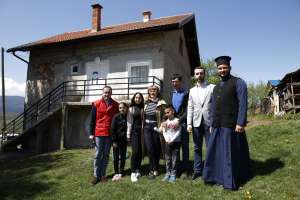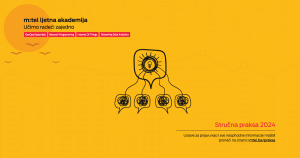SARAJEVO, March 1 (FENA) - Bosnia and Herzegovina is celebrating 29 years since the citizens decided by an almost two-thirds majority in a referendum that they want to live in an independent state.
Citizens answered one question "Are you in favor of a sovereign and independent Bosnia-Herzegovina, a state of equal citizens and nations of Muslims, Serbs, Croats and others who live in it?". Results showed they were, indeed, in favor.
The Independence Day of Bosnia and Herzegovina is one of the most significant events in the history of the country, but it's not marked in the entire country equally even though decision-makers, including politicians, historians, reporters, and professors, agree on two things - the holding of the referendum was inevitable and the independence of BiH was exclusively the decision of its citizens.
Historian Husnija Kamberović stressed the inevitability of the referendum, emphasizing that there was no alternative since, at the time, other nationalistic sentiment started to rise, such as the Serb, Croat and Slovene nationalism, who all denounced Yugoslavia and, thus, BiH had no other solution.
"BiH could have stayed in something that was only formally known as Yugoslavia, but was actually 'Greater Serbia' or it could seek independence," Kamberović told FENA, adding that BiH and its leaders were still trying to preserve Yugoslavia the best way they could.
Member of the war-time Presidency of the Republic of Bosnia and Herzegovina, academician Ejup Ganić, is of the strong opinion that the referendum had no alternative and that it was the only way to preserve the country and to survive. Even though many citizens do not celebrate March 1 - the Independence Day of BiH, he is of the attitude that they will realize in time why this date is so important for them and their country.
"If you lose your country, it takes 500 years to get it back and citizens of all nationalities made the decision on that day to vote for an independent and sovereign BiH. The referendum was a choice between either disappearing in the mists of time or preserving one's identity," Ganić told FENA.
The Vice President of the Parliament of the Republic of Bosnia and Herzegovina, Mariofil Ljubić, who signed the Decision to hold the Referendum, is of the opinion that the referendum was necessary and that all citizens had the right to voice their opinion on whether they would want to have an independent state without contemplating on the internal structure and organization of it.
Ljubić adds that the citizens of BiH were given an independent and sovereign country, but not the one that was fully functional because it is not what all its citizens had in mind.
Member of the Presidency of the Republic of Bosnia and Herzegovina Mirko Pejanović said that the decision to hold the referendum and its implementation led to a sovereign and the independent Republic of BiH represents a "historical shift".
"The referendum was a democratic expression of the will of most citizens who wanted a sovereign and independent state and that is exactly what happened based on the results. That is how BiH entered the new international, European, and world order and became subject to international law," Pejanović said.
Member of the Parliament of the Republic of BiH, Miro Lazović, said that the independence referendum had to be held in 1992 since the international community conditioned it.
However, before adopting the decision to hold the referendum, Lazović said that the politicians tried to do everything they could in order to preserve what was left of former Yugoslavia, offering different projects that the Serb Democratic Party rejected.
"In such a situation, we were simply forced to make the decision on the referendum and that's what we did on January 25, 1992, at the dramatic and chaotic session of the Parliament of RBiH where I experienced inconvenience and threats," Lazović reminisced.
Journalist Zlatko Dizdarević believes that the referendum was inevitable, given the context in which the citizens found themselves, but also due to the fact that Slovenia, Croatia, and Macedonia had already left the former Yugoslavia.
He pointed out that it was completely out of place to talk about other possibilities, but on the other hand, he emphasized that the referendum was held at a time when there was no idea that war would follow and that citizens from such a position thought about an independent and sovereign BiH.
In numbers, 2,073,568 people voted in favor of the referendum which means that the total turnout of voters was 63.6 percent and almost all those who voted were in favor of independence. Only 0.3 percent of people or 6,037 people voted against.
The results of the referendum enabled the international recognition of Bosnia and Herzegovina as an independent state. Since then, March 1 is marked as the Independence Day of BiH.
In the fateful year of 1992, 76 countries of the world recognized BiH as an independent state. The first of those was Bulgaria even before the referendum on January 31, 1992. Since then, BiH established diplomatic relations with 180 countries of the world.
EU member states recognized BiH as an independent state on April 6, 1992, and the same was done by the United States of America a day later.
On May 22, 1992, Bosnia and Herzegovina became a full member of the United Nations and it had its flag placed at the UN headquarters in New York. Not long after declaring independence, the four-year aggression against BiH was launched.
(FENA) L. N.









